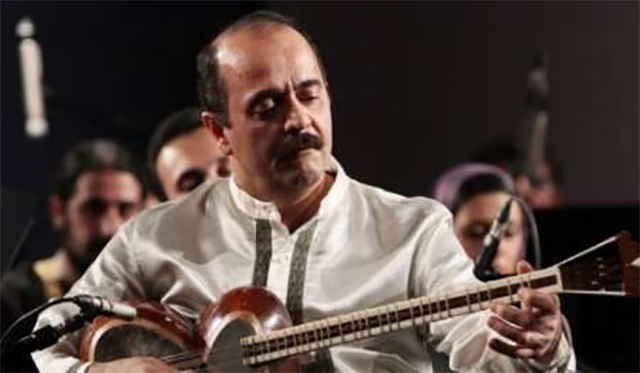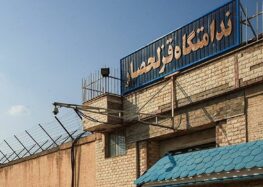Musical Concerts Face Uncertain Future in Iran Despite Rouhani’s Vocal Support

Iran’s presidential candidates faced no problems blasting cheerful music during campaign rallies ahead of the May 2017 elections. However, officially sanctioned concerts continue to be canceled following pressure by religious conservatives, while musicians and performers are subjected to threats and other forms of intimidation.
In the latest example, Keivan Saket, a popular master tar (string instrument) player, received anonymous phone calls demanding he abandon his concert in Abadan, Khuzestan Province, scheduled for May 26, 2017.
He told the semi-official Iranian Labor News Agency (ILNA) on May 25 that “zealots” also ripped down his concert banners in the southern port city.
“The destruction of banners in Abadan is probably the work of the same type of people who are opposed to culture,” he said in the interview.
“We have seen them at work in some cities in (Razavi) Khorasan Province, too,” he added. “There is also the possibility that these are reactions to the support I and the majority of the artistic and musical community gave to Mr. Rouhani in the last election.”
Centrist cleric Hassan Rouhani, who maintains close ties with reformist factions, won a second term on May 19, 2017.
On his Instagram page, Saket posted a screenshot of an anonymous text message he received: “Hello Mr. Saket. We warn you not to come to Abadan for your concert or else we will do to you what we did to Salar Aghili. Ask what kind of hell we put him through. This is a holy city. Its streets bear the blood of martyrs. What you do is an insult to the martyrs and we will not allow that.”
Popular traditional music singer Salar Aghili postponed his concert in Abadan in March 2016 to an undetermined date for undeclared reasons.
Despite the threats, Saket performed as scheduled in May 2017 and thanked the police and local officials for keeping the peace after the concert.
Since 2013, when Rouhani was voted into office promising a more open society, numerous state-sanctioned musicians, including the popular musical artists Alireza Ghorbani and Sirvan Khosravi, saw their concerts canceled at the last moment.
Religious conservatives have justified their attacks on musicians by quoting vague statements and decrees by senior religious leaders. Iran’s supreme leader, Ali Khamenei, has himself often warned about the alleged dangers of music, saying it will “lead people away from the path of God.”
Nevertheless, conservative presidential candidate Ebrahim Raisi, reportedly favored by Khamenei, publicly met with underground pop performer Amir Tataloo on May 17, two days before the elections, in a last ditch effort to attract younger voters who had overwhelmingly voted for Rouhani in the previous election.
Raisi, who heads the powerful Astan Quds Razavi religious and commercial enterprise, is the son-in-law of Ahmad Alamolhoda, the hardline conservative Friday prayer leader of Mashhad and hardline opponent of musical concerts.
“Mashhad is a city of pilgrims not a tourist center or entertainment attraction for revelry,” said Alamolhoda, the supreme leader’s representative in Razavi Khorasan Province, in a sermon on August 12, 2016.
“The sanctity of Imam Reza’s shrine does not end with its perimeter. We shouldn’t have to haggle with officials and the people about canceling concerts in Mashhad,” he added. “Before the Islamic Revolution, income from Imam Reza’s shrine was spent on lavish debaucheries for members of the royal court.”
“Do you want to hold a concert?,” he said. “Go live somewhere else. Why are you hollering and haggling here?”
Rouhani criticized Alamolhoda without mentioning him by name during his last campaign rally in Mashhad.
“You told the people of Mashhad if they want art and artistic events, they should leave the city,” he said. “Would you like to grab Iran and tell the people to leave the country?” he said on May 17.
It remains to be seen how music events will fare under Rouhani’s second-term government.
Since his re-election three weeks ago, two performances have been canceled: Omid Hajili’s May 25 pop concert in Abadan, and Hossein Behrouzinia’s May 26 traditional instrumental concert in Shiraz.





